Editor’s Note: We’ve asked the Presidents of this region’s colleges and universities to respond in 250 words or less to the following question:
Given that attracting young people is critically important to this area and your institution, how will you overcome declining enrollment trends and how might civic efforts help you do that?
Part I
JOHN C. KNAPP, WASHINGTON & JEFFERSON COLLEGE
As we determine how to support the declining population of 18-year-olds, Washington & Jefferson College must continue to focus on our foundation, which has allowed our graduates to excel as professionals. One of the reasons they excel is that we provide them with the opportunity to gain practical experience from service learning and internships throughout the region. We are grateful that leading businesses and nonprofit organizations make these experiences available. Hands-on practical experience is a feature of every Washington & Jefferson College student’s education. Washington & Jefferson College students benefit tremendously from these opportunities and engage in projects that serve our community and region. One example is the work of our small business incubator called “Ignite.” This center offers educational programs, physical space, and other support for entrepreneurs whose ideas are contributing to the economic development of our city and county. And it is an ideal place for students to develop their own businesses while also helping others. Ignite is a collaborative project of diverse public and private organizations in our community. We will continue to develop programs and provide students with the skills they need to serve the community. One of our newest programs undertaken with support from the community is a recently announced Bachelor of Science in Nursing program that will enroll its first students in fall 2024. It will be taught in conjunction with Washington Health System, a longtime community partner, providing many opportunities for service and learning.
KATHY W. HUMPHREY, CARLOW UNIVERSITY
Carlow University is grateful to have seen its enrollment grow by 10 percent since 2021, despite national enrollment declines. All colleges and universities know this cliff is coming, and that it is necessary to plan and prepare for this event. Our overall strategy is to stay mission-focused. Carlow was built by the Sisters of Mercy to meet the next great need, and that is what we will continue to do. We will continue to build on our strengths in health care, education, and the liberal arts by launching new graduate health science programs in occupational therapy, physical therapy, speech-language pathology, and physician assistants, and an innovative apprenticeship program in early childhood education. Carlow University is flexible enough to adjust to workforce development needs. We have increased our online offerings to reach students outside of our region, developed new associate degree programs in surgical technology and neurodiagnostics, and certificates in programs such as practical nursing. We have developed customized programs for our corporate and community partners, designed to upskill their workforces. This includes certificates in project management and quality assurance, and quality control. These programs put people on a career pathway, instead of “just a job.” We at Carlow are “devoted to the future of you.” We have a deep commitment to our students, community, and the region. We are excited about the changes that are occurring in the educational enterprise and we are poised to educate the 21st-century student.
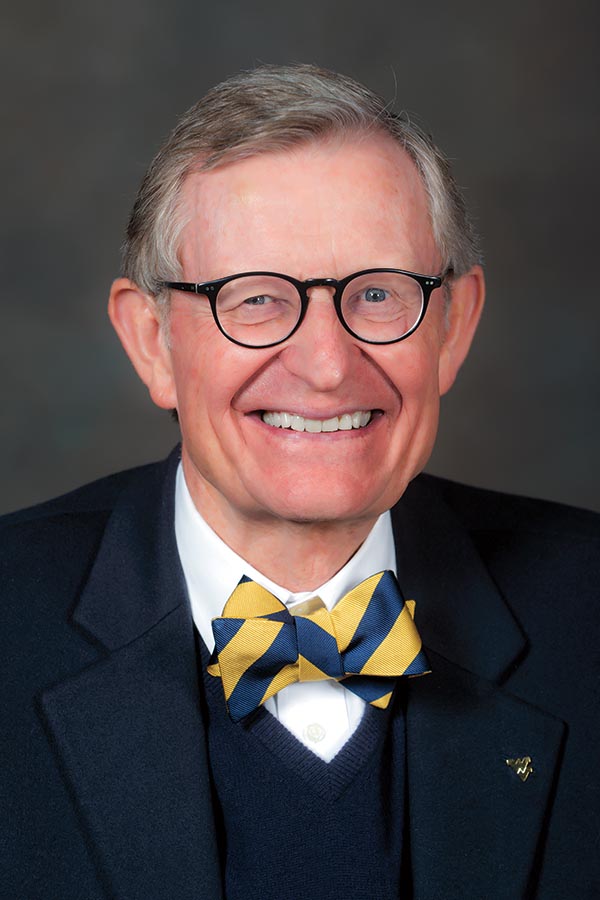
E. GORDON GEE, WEST VIRGINIA UNIVERSITY
West Virginia University will be even stronger in the decades to come, despite facing a declining college-aged population, thanks to our concentrated focus on our “First Principles.” We are putting students first, so they can achieve the success that generations of WVU alumni have. We are embracing our land-grant mission and the people we serve. And we are differentiating ourselves with programs that serve our stakeholders, reflect our values and play to our strengths. In short, we are transforming ourselves today so that we can be a responsive, relevant university system of the future. More than ever, we will be a system that meets the needs of the students — providing degrees and experiences that will lead to meaningful careers and productive lives. We will be a system that invests in initiatives to change the trajectory of our region and its people. Each of our academic and support programs has been examining its priorities to ensure we are investing wisely. Armed with that data, we are rededicating ourselves to be competitive in the evolving marketplace of ideas. To attract and serve students, we also partner with community leaders in Morgantown and throughout the region and state to support civic improvements that create a vibrant, thriving living environment. Our institution’s greatest strength is an unwavering focus on our purpose. And we will use that strength to position ourselves as the one — and only — West Virginia University.
KAREN RILEY, SLIPPERY ROCK UNIVERSITY
For more than 130 years, Slippery Rock University has embraced the same hard-working, tenacious personality espoused by the people of Western Pennsylvania. We take pride in preparing students to live, work and contribute to their communities, for their sake and for future generations of Pennsylvanians. With nearly 90 percent of our students native to Pennsylvania, we are committed to developing civic-minded graduates who choose to stay here and work close to home to make this state a great place for everyone. That’s why we have developed more than 20 new degree programs over the past seven years. This includes new bachelor’s degrees in engineering (civil, mechanical, industrial and systems, and petroleum and natural gas), homeland security, and cybersecurity; master’s degrees in physician assistant and music therapy; and doctorates in special education and occupational therapy. And this year, we launched our fifth academic college — the College of Health Professions — to strengthen clinical relationships with area health systems, including large systems in the Pittsburgh area. This has increased the visibility of the school’s health-related programs — and the appeal of the students majoring in those programs — to employers so that these students, upon graduating, will be prepared to step right into jobs that are in high demand and pay well. We believe SRU is a catalyst for population and enrollment trends to climb, rather than sitting back and coping with declines.
PAUL J. MCNULTY, GROVE CITY COLLEGE
As a Christian and conservative college, Grove City is highly distinctive both nationally and regionally. This is a wonderful advantage for building and sustaining our enrollment efforts and runs counter to the current trends in higher education. The majority of GCC’s students come from outside of Western Pennsylvania and are drawn to our emphasis on academic rigor, spiritual formation, and traditional values. Many families admire our independence, which is anchored in our principled stand against accepting government financial assistance. The breadth of impactful extracurricular activities, not always available at smaller liberal arts colleges, is attractive to talented young people. The college has developed innovative marketing and recruiting strategies that attract outstanding applicants from around the country. These strategies include utilizing an extensive alumni network to establish valuable connections with prospective students and emphasizing our Christ-centered learning environment where young scholars can pursue truth freely, humbly, and together. GCC’s Institute for Faith and Freedom continues to draw growing numbers of students interested in public policy and civic engagement. Indeed, the college’s mission includes equipping graduates to be educated and engaged citizens. With the launch of a historic $185 million capital campaign connected to our upcoming 150th anniversary, the college is enhancing facilities and resources, increasing financial aid, and working hard to keep tuition among the lowest in Pennsylvania for generations to come.
KATHY BRITTAIN RICHARDSON, WESTMINSTER COLLEGE
Enrollment growth is driven by effectively marketing strong academic and co-curricular experiences and inclusive student support. We have expanded our academic offerings in the sciences, business and health care. Building on the longtime success of our graduate programs in education, which have trained excellent principals and superintendents across the region, we recently added an MBA with emphases in health care management, business and data analytics, sustainability and management. This summer we launched an online R.N. to B.S.N. completion program for practicing nurses who want to advance their careers, which complements the college’s strong B.S.N. program. Westminster’s leadership is deeply committed to working with local and regional organizations to promote economic growth, provide numerous ways for our students to gain valuable experience, and to foster regional ties — efforts that are housed under the new Office for Professional Development and Community Engagement. Today’s college-bound undergraduates report that, while high-quality academics are important when selecting an institution, they want to supplement those rich classroom experiences with such practical opportunities as internships, networking and job shadowing. These opportunities at Westminster also may come through undergraduate research projects, which frequently focus on local and regional topics. Our Center for Entrepreneurship connects 80 students each semester with professional mentors and training in business planning and launches; students in many academic areas, from history to finance, complete internships, practicums or service-learning projects while enrolled. These initiatives attract students by providing experiential pathways to success in graduate school and careers.
